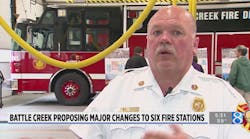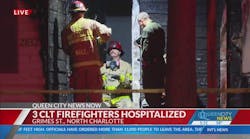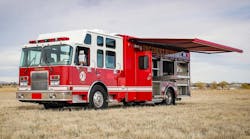March 26--Denise Elarms battled fires in San Francisco for 12 years, until she was diagnosed with breast cancer in 2011. Since then, she not only has been fighting for her life -- she also has been fighting for a paycheck.
Elarms' work as a firefighter exposed her to toxic chemicals, carcinogens that she believes -- and a mounting body of evidence suggests -- caused her stage four breast cancer, leaving her unable to work. But when she applied for workers' compensation three years ago, then again when she decided to retire earlier this year, Elarms found herself on the defensive, essentially being asked to prove that her illness is job-related.
A law being drafted by Board of Supervisors President David Chiu may change that and put the city in the company of 19 states, including California, that already give firefighters the presumption that disabilities from illnesses such as cancer or heart disease were caused by their work. Such laws allow them to more easily access workers' compensation and early retirement benefits, as well as death benefits for their families.
Right now, a San Francisco firefighter who retires early because of cancer cannot collect a full paycheck until reaching retirement age, said Tom O'Connor, head of the firefighters union.
Higher cancer rates
And Elarms isn't alone in her illness: At least 230 San Francisco firefighters have died of cancer over the past decade. O'Connor said breast cancer rates among women in the San Francisco department are six times the national average.
"I cannot do the job anymore, and I really am not capable of doing too much," said Elarms, a soft-spoken woman who has suffered memory loss and neuropathy from chemotherapy and now walks with a cane.
Elarms said the ongoing fight over her benefits left her severely depressed and struggling to pay her bills.
"I do own a home and have bills, a mortgage -- these are things my career had afforded me to have," she said. "I didn't want to lose that, but there was a time when I was going through severe chemo every two weeks ... and before it was time to go back for another round, they would be sending me these forms, saying, fill this out, fill that out. I couldn't even think -- I was sick, laying in bed.
"Someone asked me, 'What it's like?' It's like being in hell," she said. "They asked me, 'Could I ever go through it again?' I don't think I could. I would just rather die."
The legislation is only one part of an ongoing campaign by firefighters around the nation to let people know about the cancer risks that they face and implement policies that either mitigate those dangers or help out those who are already sick.
Union backs nonprofit
San Francisco's fire union has played a large role, creating a nonprofit, the San Francisco Firefighters Cancer Prevention Foundation, that assists with early cancer detection, advocates for ill firefighters and works to prevent unnecessary exposure to harmful chemicals, including flame retardants.
The foundation pushed for a 2009 federal study conducted by the National Institute of Occupational Safety and Health that examined the long-term health of 30,000 firefighters in San Francisco, Chicago and Philadelphia. That study found higher incidences of respiratory, digestive and urinary cancers, and twice the general population's rate of mesothelioma, which is caused by asbestos, among firefighters.
The sample size for breast cancer wasn't high enough in the 2009 study to link it definitively to firefighting, but O'Connor said that number has doubled over just the past five years, and the authors are in the process of updating the study to include breast cancer as a risk.
O'Connor said the proposed legislation, which the union brought to Chiu, is an important step to help ailing public servants, in large part because it will allow people such as Elarms to collect their full pension if they have to retire early. But even with that presumption, O'Connor acknowledged, firefighters often still must convince government lawyers that their illness is job-related, as Elarms had to do with her workers' compensation claim.
Signs of improvement
That process seems to be getting better as awareness of the risks of firefighting increases.
"We know that if you get occupational cancer, and start treatment, you will inevitably get turned down at first," he said. "Even though there's a presumption (under state law), you are still guilty until proven innocent."
O'Connor said the legislation will help make that process even easier.
"No one who gives their health and well-being to San Francisco should have to beg to survive once their health is taken from them," he said. "This legislation would allow firefighters who are disabled to such an extent that they can no longer work to retire with dignity and be able to support themselves."
Chiu, who is still working with city attorneys to draft the legislation, said he was surprised city law doesn't already include this presumption.
"I think its pretty simple: We need to assure our firefighters that if they get cancer due to their work, they will be taken care of," he said. "The evidence of the link between cancer and firefighters is sobering, and I am hopeful everyone will understand how important this is."
Marisa Lagos is a San Francisco Chronicle staff writer. E-mail: [email protected] Twitter: @mlagos
Copyright 2014 - San Francisco Chronicle





